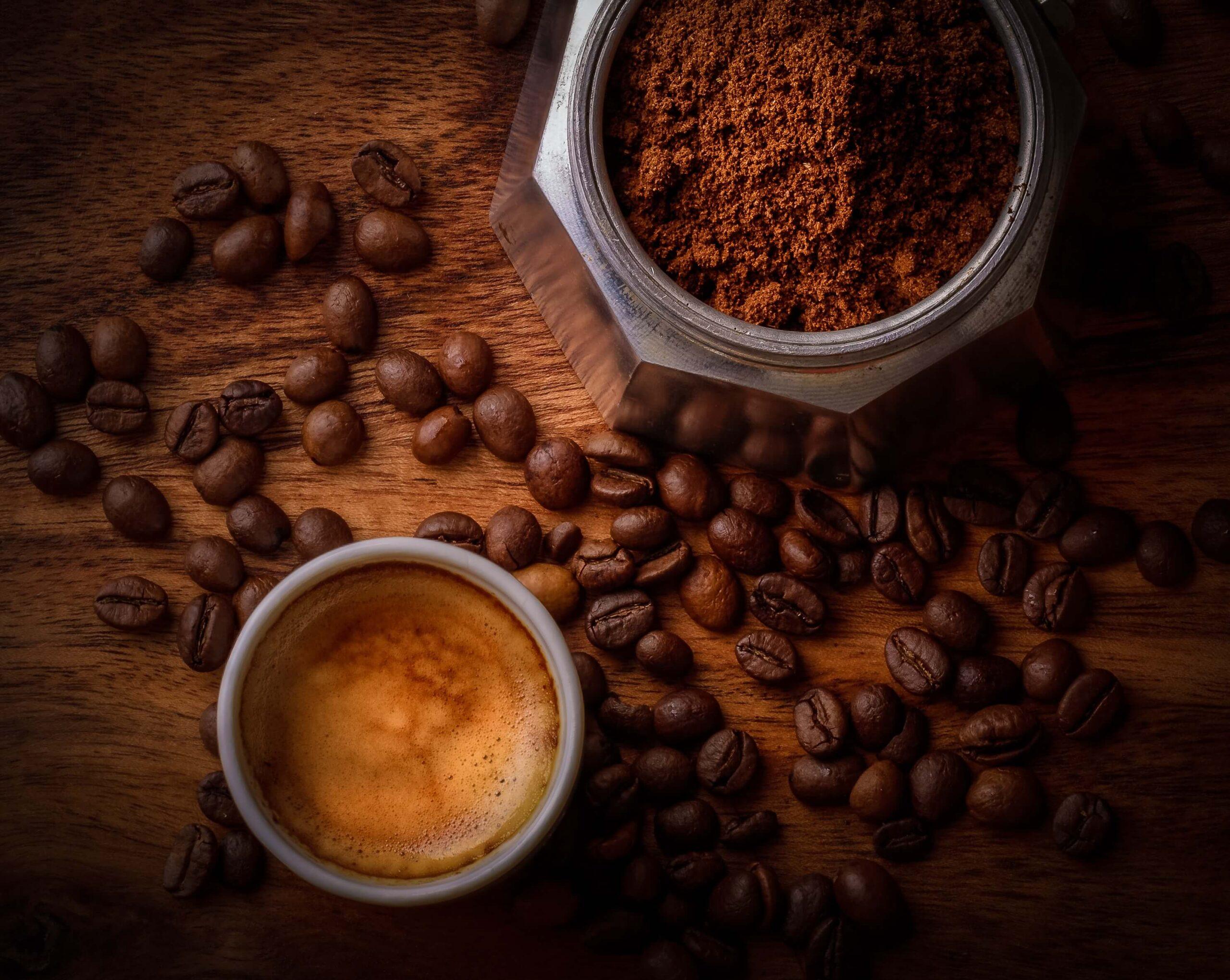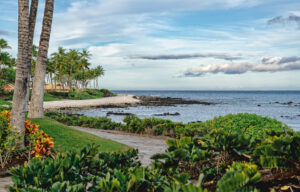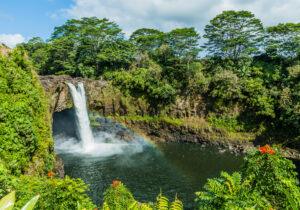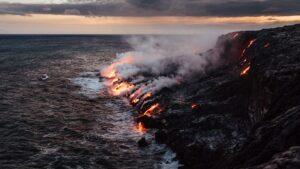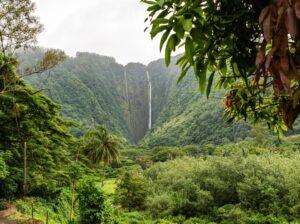In the tropical paradise of Hawaii, there’s a lot more brewing than just sunshine and waves. One thing that has gained immense popularity in the Hawaiian islands is coffee, and at the heart of this caffeine craze lies Kona coffee.
In this post, we’ll explore the unique charm of Kona coffee, why it’s so popular, and what makes it a favorite among coffee aficionados and travelers alike.
The Origins of Kona Coffee
The journey of Kona coffee begins on the slopes of Mauna Loa, one of the five volcanoes that make up the Big Island of Hawaii. The combination of rich volcanic soil, ample rainfall, and just the right amount of sunshine creates an ideal environment for coffee cultivation.
The history of Kona coffee dates back to the early 19th century when Samuel Reverend Ruggles planted the first coffee seeds in the Kona region. Since then, the coffee culture has flourished, making Kona coffee synonymous with Hawaiian coffee.
Why is the Kona Region of Hawaii great for coffee?
Kona’s unique microclimate, characterized by rich volcanic soil, moderate temperatures, and consistent rainfall, provides the ideal conditions for cultivating high-quality coffee beans.
Additionally, the elevated altitudes of many Kona coffee farms result in beans with complex and nuanced flavors, thanks to the slower maturation process.
Dedication to quality is a hallmark of Kona coffee production, with careful harvesting, meticulous processing, and stringent quality control measures in place. Its exclusivity, sustainable farming practices, deep cultural connections, and global recognition further enhance the allure of Kona coffee.
These combined factors make the Kona region of Hawaii a prime location for coffee cultivation, resulting in a product that is highly sought after by coffee enthusiasts worldwide.
What makes Kona coffee special compared to other coffee?
Kona coffee’s distinctiveness in comparison to other coffee varieties can be attributed to its unique growing conditions. The Kona region’s microclimate, characterized by rich volcanic soil, moderate temperatures, and consistent rainfall, imparts a flavor profile that is difficult to replicate.
Its exclusivity, being grown solely in the Kona region of Hawaii, adds to its prestige and rarity.
What makes Kona coffee so expensive?
Kona Coffee’s premium price tag is a result of several contributing factors: scarcity, agricultural and other regulations, labor costs, high demand, and limited supply.
Its scarcity, grown exclusively in the Kona region of Hawaii, leads to a limited supply, making it a rare and sought-after commodity. Strict agricultural and quality regulations, including sustainability standards, drive up production costs. Labor costs are high due to Hawaii’s cost of living and the meticulous nature of coffee farming, which often involves hand-picking cherries.
Additionally, the significant demand for Kona coffee from both coffee enthusiasts and travelers further escalates its price, creating a unique and expensive coffee experience.
The Kona Coffee Experience
Kona coffee is celebrated for its rich and unique flavor profile. The beans are hand-picked when they’re perfectly ripe, and then they undergo a meticulous process that includes pulping, drying, and milling.
This dedication to quality is reflected in every cup of Kona coffee, delivering a smooth, full-bodied, and slightly nutty taste. It’s a sensory journey that coffee enthusiasts from around the world can’t resist.
Kona Coffee Sustainability
One of the reasons Kona coffee has gained immense popularity is its commitment to sustainability and ethical practices. Many Kona coffee farms are small, family-owned operations.
The care and attention to detail in cultivating the coffee not only results in a premium product but also ensures that the environment is respected. The coffee trees are often grown in harmony with other crops, preserving the lush landscape of Hawaii.
Challenges of Kona Coffee Farming
Despite its popularity, Kona coffee farming is not without its challenges. The high cost of land and labor in Hawaii can make it difficult for small-scale coffee farmers to compete in the global market.
Additionally, the coffee industry faces environmental concerns, such as the impact of climate change on coffee production. Awareness of these challenges is crucial in understanding the intricacies of Kona coffee production.
Historical Significance Of Kona Coffee
Kona coffee is not only celebrated for its unique flavor but also for its historical significance in Hawaii. As one of the longest-standing coffee traditions in the United States, Kona coffee has deep roots in the culture and economy of Hawaii.
It has played a pivotal role in shaping the local community, providing livelihoods for generations of farmers, and contributing to the islands’ agricultural heritage.
Where did Kona coffee come from?
In the 1820s, Hawaii’s introduction to coffee began with its journey from Brazil. Initial attempts to establish coffee crops occurred in Manoa Valley on Oahu, but these early plantings faced challenges and didn’t thrive. However, in 1828, coffee found a more promising home on the Big Island, with the first plantings taking root in the Hilo area.
It was during the same year that Reverend Samuel Ruggles made a significant contribution to Hawaiian coffee history. He took seedlings from these early endeavors and, on the westward volcanic slopes of the Big Island, planted the very first coffee trees in the Kona region.
Quality Control and Regulations Of Kona Coffee
To maintain the exceptional quality of Kona coffee, Hawaii has established strict regulations and certification processes. Coffee labeled as “100% Kona Coffee” must meet specific criteria and be grown in the Kona District.
This dedication to quality control ensures that consumers receive a product that lives up to the Kona coffee reputation.
Kona Coffee: Global Recognition
Kona coffee’s popularity extends far beyond the shores of Hawaii. It has gained recognition worldwide, often winning awards and accolades for its outstanding quality. Its presence in international coffee competitions showcases its appeal to a global audience.
Hawaii’s Coffee Belt
While Kona coffee takes the spotlight, it’s worth mentioning that Hawaii has more to offer when it comes to coffee. The state has a diverse range of microclimates, each suitable for different coffee varieties.
From the vibrant coffee culture on the island of Maui to the unique flavors of the Hamakua Coast, Hawaii’s Coffee Belt provides a delightful variety of coffee experiences.
Why Kona Coffee is So Popular
- Exclusivity: Kona coffee’s unique growing conditions and the limited geographic area where it’s cultivated make it an exclusive and sought-after coffee variety.
- Flavor Excellence: The distinct flavor of Kona coffee, with its balance of acidity and boldness, makes it stand out among other coffee varieties.
- Sustainability: The eco-friendly practices of Kona coffee farms resonate with environmentally conscious consumers.
- Cultural Appeal: Kona coffee is deeply ingrained in Hawaiian culture, making it an integral part of the Hawaiian experience.
- Tourist Attraction: Kona coffee tours are not only educational but also provide tourists with memorable experiences.
Kona Coffee Is Just One Of Hawaii’s Treasures
Kona coffee’s popularity is not merely due to its outstanding taste; it’s a complex blend of history, culture, quality control, and environmental factors. The dedication of Kona’s coffee farmers to uphold the tradition of producing exceptional coffee has led to its continued success.
Whether you’re a coffee connoisseur or a casual coffee drinker, Kona coffee offers a memorable and flavorful journey through the heart of Hawaii.
Kona Coffee Tours
For visitors to Hawaii, experiencing Kona coffee firsthand is a must. Many coffee farms in the Kona region offer tours, allowing guests to walk through the lush coffee plantations, see the entire coffee-making process, and, of course, sample the aromatic brew.
These tours provide a deeper appreciation for the time and effort that goes into producing a single cup of Kona coffee.
Join Us At Kailani Tours For A Coffee Tour!
Join us at Kailani Tours for an unforgettable coffee tour experience! Dive into the world of Kona coffee, savor its rich flavors, and explore the lush landscapes where it’s cultivated. Don’t miss out on this unique adventure. Book your Kailani Tours coffee tour today and make your visit to the Big Island truly special.

